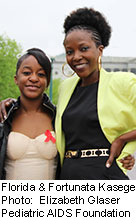- Recognizing the Signs of Hypothyroidism
- 10 Strategies to Overcome Insomnia
- Could Artificial Sweeteners Be Aging the Brain Faster?
- Techniques for Soothing Your Nervous System
- Does the Water in Your House Smell Funny? Here’s Why
- Can a Daily Dose of Apple Cider Vinegar Actually Aid Weight Loss?
- 6 Health Beverages That Can Actually Spike Your Blood Sugar
- Treatment Options for Social Anxiety Disorder
- Understanding the Connection Between Anxiety and Depression
- How Daily Prunes Can Influence Cholesterol and Inflammation
Mother-Daughter Team Preaches the Gospel of HIV Prevention


TUESDAY, Dec. 24Fortunata Kasege was just 22 years old and several months pregnant when she and her husband came to the United States from Tanzania in 1997. She was hoping to earn a college degree in journalism before returning home.
Because she’d been in the process of moving from Africa to the United States, Kasege had not yet had a prenatal checkup, so she went to a clinic soon after she arrived.
“I was very excited to be in the U.S., but after that long flight, I wanted to know that everything was OK,” she said. “I went to the clinic with mixed emotions — excited about the baby, but worried, too,” but she left the appointment feeling better about the baby and without worries.
That was the last time she’d have such a carefree feeling during her pregnancy.
Soon after her appointment, the clinic asked her to come back in: Her blood test had come back positive for HIV.
“I was devastated because of the baby,” Kasege said. “I don’t remember hearing anything they said about saving the baby right away. It was a lot to take in,” she added.
“I was crying and scared that I was going to die,” she said. “I was feeling all kinds of emotions, and I thought my baby would die, too. I was screaming a lot, and finally someone told me, ‘We promise we have medicine you can take and it can save the baby and you, too.’ “
Kasege started treatment right away with zidovudine, which is more commonly called AZT. It’s a drug that reduces the amount of virus in the body, known as the viral load, and that helps reduce the chances of the baby getting the mother’s infection.
“I had to take it every four hours, even in the middle of the night, so I set an alarm for the middle of the night,” she said. “I had to make sure my baby would be OK. I had to do it precisely perfectly for my baby, and I didn’t miss a dose. In 1997, the chance of transmission was said to be 12 percent, but my doctors said don’t worry, we haven’t seen anyone who’s adhered to the medicine have a baby with HIV. And they were correct. My baby was healthy. And I was healthy. It was such a happy time that came from the worst feeling.”
Kasege had a daughter, and she named her Florida. The baby’s test came back negative for HIV, but to be safe, Kasege enrolled her in a study that tracked little Florida for two years to be sure she didn’t develop HIV, the virus that causes AIDS. And, she didn’t.
Florida is now 16 years old, and for years she’s been helping her mother spread the word about preventing HIV infection. Kasege is an ambassador for the Elizabeth Glaser Pediatric AIDS Foundation.
“I want other women with HIV to know that you can have a good ending,” Kasege said. “Your story doesn’t have to end tragically. It’s a bad feeling for a mom to even think about it. But, you can protect your baby. Be hopeful and stick to the treatment, and your baby will be fine.”
Kasege’s faithful adherence to her medication hasn’t helped just her daughter but has helped her as well.
“My virus is undetectable, and it’s been that way since three months after I started taking the medication,” she said. “I worry about other things now, raising a teenager. I don’t worry about HIV.”
More information
This HealthDay story describes the gains in the fight against pediatrics AIDS cases in the United States.
Source: HealthDay
Copyright © 2026 HealthDay. All rights reserved.










